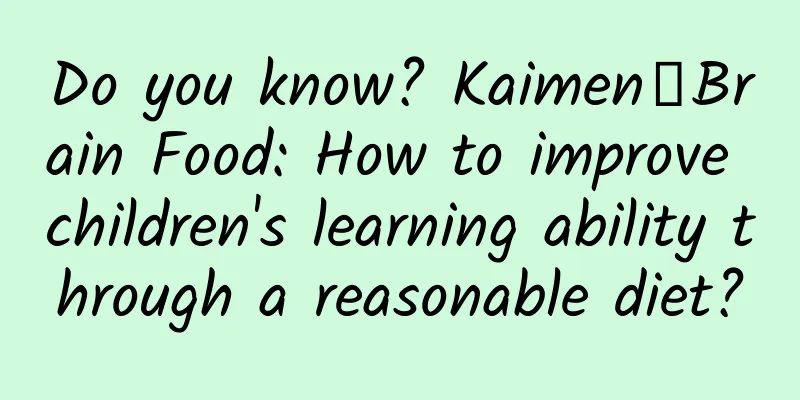Do you know? Kaimen┋Brain Food: How to improve children's learning ability through a reasonable diet?

|
Written by: Li Yue, attending physician of the Department of Clinical Nutrition, First Affiliated Hospital of Xinjiang Medical University, registered dietitian in China Reviewer: Li Li, President of Xinjiang Nutrition Society, Director of the Clinical Nutrition Department of the First Affiliated Hospital of Xinjiang Medical University, Chief Scientific Communication Expert of the Autonomous Region, Health Science Popularization Expert of the Autonomous Region Health Commission I believe that most parents, like me, are concerned about how to improve their children's learning ability. The first thing we usually consider is the secret weapon of vitality! Yes, I am talking about brain food! 1. Key nutrients and learning ability Nutrition plays an important role in improving learning ability. The brain needs fuel, and only by providing it with the right nutrients can the learning engine perform at its best. A. Carbohydrates: The main source of energy for the body and brain The brain has a high demand for energy, especially when performing cognitive tasks and thinking. Low blood sugar may cause poor concentration, fatigue, and mood swings. However, excessive intake of high-glycemic foods may cause drastic fluctuations in blood sugar levels, which can also affect brain health. Complex carbohydrates (such as whole grains, vegetables, and fruits) should be the main source of energy, and excessive intake of high-glycemic foods (such as sugar and processed foods) should be avoided. B. Fat: Maintaining neural function and learning mechanisms Foods rich in healthy unsaturated fatty acids, such as fatty fish (salmon, cod, eel, salmon, etc.), nuts and olive oil, can provide important fuel for the brain, promote the normal functioning of neurotransmitters, and enhance memory and learning ability. In Xinjiang's dietary habits, marine fish and olive oil are rarely eaten. You can increase the intake of high-quality fats by giving children extra DHA, eating more shellfish and shrimp, and using olive oil when mixing cold dishes at home. C. Protein: Building brain neurotransmitters and cells Meat, fish, legumes, and dairy products are some of the protein-rich options that can provide the necessary nutrients your brain needs. D. Vitamins and minerals: promote brain function and learning performance Iron, folic acid, vitamin B12, iodine and zinc are involved in the formation of nerves; iron, B vitamins, choline, zinc, iodine and copper are involved in the synthesis and function of neurotransmitters; iron, folic acid, vitamin B12, choline, iodine and copper can increase the speed of nerve transmission. It is recommended that children eat 1 egg a day, 15g of nuts a day, and animal liver 1-2 times a week to ensure the intake of vitamins and minerals. 2. Eating strategies and learning performance A. Importance of a balanced diet: providing variety and nutritional balance Try to choose a combination of whole grains, vegetables, fruits, protein, and healthy fats to build a nutritionally complete eating plan. B. Fast-Release vs. Slow-Release Energy Foods: Balancing Energy and Focus In the morning or before studying, you can choose some fast-releasing carbohydrates, such as fruits, steamed buns, rice porridge, etc., to quickly provide energy to the brain. After meals or when studying for a long time, choose slow-releasing carbohydrates, such as whole wheat bread, oats, mixed bean porridge, etc., which can ensure a continuous supply of energy and avoid fatigue caused by energy fluctuations. C. Heavy food before and after meals: affects learning effect and digestive burden If children eat too much before and after studying, their stomach and intestines will be too full, which will cause blood to concentrate in the digestive system instead of the brain, affecting their concentration and attention. Therefore, children can eat until they are 70% to 80% full at each meal, and have a small snack with low salt, low sugar and low fat before or during study, such as sugar-free yogurt, whole wheat bread, nuts, dried sweet potatoes, dried fish, etc. 3. Build a nutritious study diet system A. Quick breakfast options: convenient and nutritious ①Mixed bean porridge: Mix different kinds of beans and grains, and add some walnuts, peanuts, red dates, raisins, etc. ②Yogurt and fruit: Choose low-fat yogurt and add fresh fruits or nuts, such as blueberries, strawberries and almonds. ③ Whole wheat bread and cheese slices: Choose whole wheat bread, top it with eggs and cheese slices, spread some olive oil on it, and add some vegetables, such as tomatoes or cucumbers. ④ Oatmeal: Choose oatmeal milk or oatmeal porridge, and add some fruits or nuts, such as raisins or chopped walnuts. B. Smart snack choices: nourishing the brain and replenishing energy ① Nuts: Choose some nuts rich in healthy fats and protein, such as almonds, walnuts, cashews, etc. ② Slice fruits and vegetables: Choose some fruits and vegetables that are easy to carry and eat, such as carrots, pears, apples, cherry tomatoes, etc. ③Yogurt or soy milk: Choose some high-protein yogurt or soy milk, and add some fruits or nuts. C. Nutritious lunch and dinner: provide long-term continuous energy supply ① Vegetables and protein: Make sure there are enough vegetables and protein in both lunch and dinner plates. Choose vegetables of various colors, such as tomatoes, carrots, spinach, etc. Also choose protein sources such as lean meat, fish, beans or soy products to meet the body's needs. ②Whole grains and complex carbohydrates: Choose whole grain foods or complex carbohydrates, such as whole wheat rice, whole wheat bread, brown rice or buckwheat. These foods provide lasting energy and help stabilize blood sugar levels. ③ Healthy fats: Include some healthy fat sources, such as olive oil, fish oil or nuts. Healthy fats help maintain the health of the brain and nerve tissue and improve learning ability. 4. Eating habits and learning outcomes A. Importance of drinking water: maintaining water balance and brain function The brain is made up of 70% water. When we lack water, it can cause dehydration of brain cells, thereby interfering with the efficiency of nerve transmission, and then affecting attention, memory, thinking ability and reaction ability. The recommended daily water intake for students is: 800ml for 6-year-olds; 1000ml for 7-10-year-olds; 1100-1300ml for 11-13-year-olds; 1200-1400ml for 14-17-year-olds. Drink water in small amounts and multiple times, and do not wait until you are thirsty to drink water. It is recommended to drink 100-200ml of water during each break. B. Sleep and diet: The impact of sleep quality on appetite and learning Lack of sleep can lead to abnormal appetite, increase the craving for high-energy foods and junk food, and neglect the intake of healthy foods. This is because lack of sleep can interfere with the balance of hunger and satiety hormones in the body and affect the appetite regulation mechanism. Good sleep can promote memory and learning. At the same time, during sleep, the brain consolidates and organizes memory, which helps improve memory and learning outcomes. Students should ensure adequate sleep every night, establish a regular sleep schedule, and create a good sleeping environment, such as maintaining a quiet, comfortable and dark sleeping environment, and staying away from electronic products, etc. These are essential for improving sleep quality and learning outcomes. Key Points ①Diverse food brings nutrition: Incorporate vegetables, proteins and whole grains of various colors into your diet to make every meal as rich and varied as a rainbow. ② Develop the habit of drinking water at any time: Water is the "gasoline" of the brain. Don't wait until you are thirsty to remember to replenish water. Keep a water cup close at hand. ③ Get a good night’s sleep: Sleep is closely related to appetite and self-control. It is also the key to the brain’s organization of memory. Try to get 7-8 hours of sleep every night. Remember, if you eat well, drink right, and sleep well, you can learn more effectively. Let your children enjoy learning while enjoying a delicious meal! References: [1]https://www.uptodate.com/contents/fish-consumption-and-marine-omega-3-fatty-acid-supplementation-in-pregnancy (Assessed on April15th, 2022) [2] Yang Yuexin and Ge Keyou, eds., Encyclopedia of Chinese Nutrition Science (Second Edition) [M]. Beijing: People's Medical Publishing House, 2019, P319, 1118, 1168, 143, 319 [3] Ma Guansheng. Expert interpretation: core recommendations of the Dietary Guidelines for Chinese School-age Children (2022)[J]. Chinese Food and Nutrition, 2022, 28(6):F0003. [4] National Health Commission of the People’s Republic of China, Nutrition Guidelines for Student Meals, Industry Standard WS/T 554—2017. |
>>: After myopia surgery, what visual acuity is considered successful?
Recommend
Is breast tenderness ten days before menstruation normal?
At present, many women experience breast pain bef...
How often should women have sex?
Sexual intercourse is a key component of the sexu...
Vaginal inflammation irritation lumps
Vaginitis is a common gynecological disease among...
Can't eat mushrooms if you have kidney disease? Wrong! This is good for your kidneys
Many people think that they cannot eat mushrooms ...
Understanding the spread of infectious diseases in one article
In the course of human evolution, infectious dise...
If you want to supplement protein, you should eat more meat? You must eat enough of this kind of food
Mention protein supplementation Many people's...
Girls have acne on both sides of their labia
There are many reasons that may cause vulvar itch...
Causes of small lumps in breasts
I believe everyone knows the importance of breast...
What should I bring when traveling to Thailand? What procedures do I need to go through when traveling to Thailand? How much does it cost?
Thailand is one of the most famous tourist destin...
Does ovulation start on the day of menstruation or after menstruation?
We often emphasize our ovulation period in normal...
Stomach rumbling after transplant
In recent years, more and more people have been s...
Average number of months to get pregnant
It is not possible to generalize how many months ...
What is the treatment for postpartum cervical erosion?
The treatment of postpartum cervical erosion is a...
Which is more accurate, a test strip or a pregnancy test stick?
Modern medical equipment is very scientific and a...
Will green walnut wine be poisonous? Why is the color of green walnut wine black?
Green walnuts have many benefits when used to mak...









